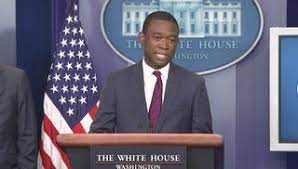According to Deputy US Treasury Secretary Wally Adeyemo, the US and its allies are planning further sanctions on more areas of Russia’s economy that are vital to the country’s invasion of Ukraine, including supply lines.
Adeyemo said the expansion of sanctions efforts was aimed at damaging “the Kremlin’s ability to operate its war machine,” while speaking in London on a European trip to engage with partners on strengthening and enforcing sanctions to punish Russia.
“We plan to take efforts to undermine their essential supply chains in addition to punishing corporations in sectors that facilitate the Kremlin’s malign activities,” Adeyemo said at a Chatham House event.
“Our goal is to deploy an integrated approach that includes both long-term export bans and rapid penalties,” he said, adding that they would also target Russia’s alternative military suppliers.
Russian President Vladimir Putin has dispatched troops to Ukraine for a “special military operation” aimed at demilitarizing and “denazifying” the country.
Since the invasion began on February 24, western allies have frozen Russia’s central bank’s foreign currency assets, prohibited important Russian banks, and affluent elites from transacting in hard currency, and imposed export restrictions on advanced semiconductors and other technologies.
The sanctions have depleted the Kremlin’s financial resources and harmed Russia’s economy. Adeyemo stated that they would remain in situ as long as the invasion went on.
He credited the sanctions’ success to a strong multilateral effort and the strength of an international economic and financial system built by democratic countries at the end of WWII, which included institutions such as the International Monetary Fund, the World Bank, and the World Trade Organization’s precursor.
NORMS APPLICABLE INTERNATIONALLY
These institutions established international standards, norms, and values that paved the way for decades of prosperity, but which Russia disregarded in its invasion, he explained.
Adeyemo predicted that countries like China and India would stay in the global financial system rather than see the Ukraine crisis as an opportunity to break away from the West.
“Not just in Western countries, the system has evolved and adapted to members who have come along to generate tremendous reductions in poverty,” he remarked. “That is why, in the end, I believe people will stay in the system since the system’s benefits far outweigh the risks.”
It was not open, however, to anyone who did not respect the essential principles of territorial integrity and self-determination, such as Russian oligarchs punished by sanctions and those who could try to assist them hide their assets, he said.
Adeyemo said the international system that led to the sanctions needs to be strengthened, especially by tackling food poverty caused by the crisis in Ukraine, which has interrupted grain exports.
To maintain their effectiveness, he noted, economic sanctions must be modified, including avoiding unilateral moves and ensuring that they are related to specific policy objectives that can be readily reversed when they are accomplished.
He also stated that the international community must complete the global minimum corporate tax accord and continue to provide the resources required to stop the COVID-19 pandemic, including increased vaccine availability.

















